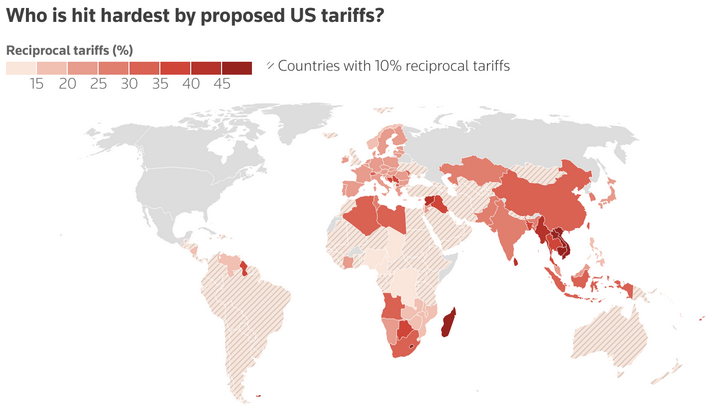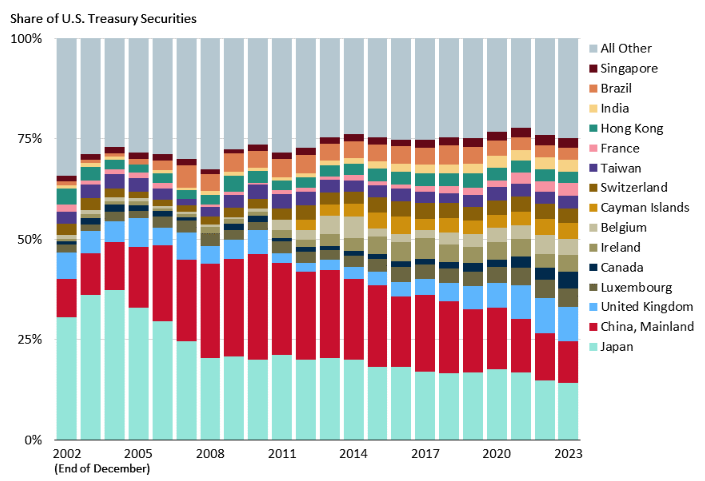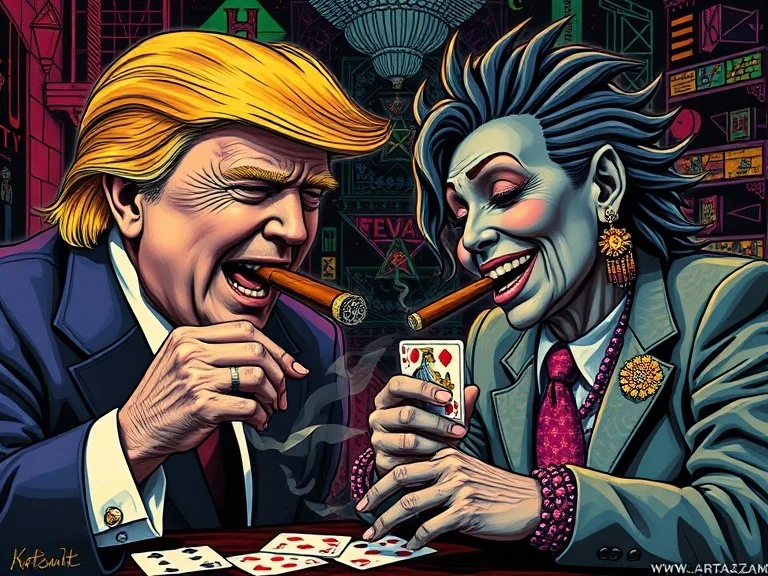Why Trump Just Unleashed Massive Global Tariffs
'To me the most beautiful word in the dictionary is "tariff"'.
Trump said that in October 2024. And he's expressed the same sentiment many times. So we can't accuse him of springing this mess on us. He told us this was coming.
His Liberation Day tariffs have thrown global markets into panic mode, sending shockwaves across economies and forcing every major player to scramble.
His next move may be even more shocking and unforeseen. He may be gearing up for something that could dismantle the foundational pillars of our entire economic system. We're going to dive into exactly what his next move could be. It's something that no one seems to be discussing seriously yet, so it's bound to catch the market off guard if and when it goes down.
But first, let's unpack the immediate and broader implications of his latest tariff war.
So, What Exactly Did Trump Do?
Unless you've been living in a cave, under a glacier, cut off from the sunlight by millions of tonnes of ice, you've likely heard a murmur about the global order of things being turned on its head last week.
In true bull-in-a-china-shop fashion, Trump unleashed a barrage of tariffs on everyone from America's ardent foes to its closest allies. Tariffs were levied at varied rates from 10% and appear to have been largely apportioned based on the balance of trade.

US tariffs by country (Source: Reuters)
China was hit hard, with existing tariffs bumped up to 54%. Let's be clear. That's not just a blow to China. About 30% of Australia's exports go to China. These tariffs will be felt in bulk commodities like iron, coal and lithium.
The new taxes will hit everything from steel to smartphones. All pitched under Trump's favourite banner of America First. The stated goal is to revive domestic manufacturing, creating blue-collar jobs.
The message to the world is clear. Trump is back, baby! And he's playing by his own rules. Tradition be damned.
Why the Hell Did Trump Do It?
Here’s where it gets juicy. Two big theories might explain Trump’s sledgehammer approach to global trade.
Theory 1: Rebuilding US Industrialisation
Trump's disdain for the global economic order pervades every speech. He resents countries that make money trading with the US. He resents countries that receive aid and those that benefit from US military protection.
Trump views himself as a king and expects his loyal subjects (i.e. every other country in the world) to pay tribute.
There are two things he loves in this world. First is the US dollar's status as the global reserve currency. This is paramount, as it keeps the rest of the world dependent on US success.
It not only allows super cheap borrowing rates for the US, it also underpins US geopolitical dominance.
So whatever Trump does to upset the world, tariffs and all, he'll be very vigilant to make sure that no one gets any smart ideas about ditching the USD as the reserve currency.
That's a non-negotiable for him.
The second thing he loves is factories. Specifically, he loves it when they are located in the US.
Bringing manufacturing and industrialisation back to the US does a few important things for Trump.
First, it rewards his core voter demographic of working-class middle America. Those are the folks who voted him in, and Trump has shown many times that the idea of loyalty is something he holds as a core belief. Bonus points if it's loyalty towards him.
So, if he can shore up the love of the common people by giving them more jobs with little more than a few pen strokes, well, why not?
Secondly, if tariffs have the intended effect of revitalising US industry, it goes a long way to shoring up US dollar reserve currency status. It's a massive gamble on this point, as we are yet to see if this whole situation blows up in his face and sends other countries away from the dollar.
The great thing about tariffs is that they raise money for government coffers. They are just another tax on US citizens, which means some extra money to plug the leaking budget.
On top of that, if there’s a flood of producers reshoring to the US. That means more workers pay income tax, and more companies pay corporate tax. So, all of that together could be a substantial boost to the government balance sheet.
The last reason is slightly less obvious. War is coming. It's always coming. While it's been 70 years since the end of World War II, it would be naive to believe that a conflict of that scale will never erupt again.
To be good at war, countries need to have strong industrial economies that can be quickly switched to the manufacture of munitions. That puts China squarely in pole position when it comes to getting started in war, and the US pretty close to last.
That's something that Trump will be wanting to fix. This industrial headstart made the Germans successful at the start of World War II. They were heavily industrialised and could produce massive amounts of munitions and equipment.
Trump's masterstroke could be to force nations into deals where they must buy American goods or set up substantial local operations to avoid his tariffs. He could even lock countries into mandatory purchasing quotas, ensuring American manufacturing not just survives but thrives.
This shock and awe tactic of tariffs seems likely a negotiating tactic to force other countries to bring him peace offerings.
Theory 2: Trump’s Radical Debt Detox
But there’s an even more audacious scenario. One where Trump isn’t just looking to play economic chess but to flip the entire board. The tariffs, combined with his infamous DOGE initiative, might be his ticket to obliterating America's massive debt (now over US$33 trillion). By aggressively taxing imports, Trump essentially imposes stealth taxes to generate vast federal revenue without explicitly hiking traditional taxes.
This strategy is economic austerity in a complicated and messy way. It will hit the economy like a massive rate hike. Fiscal policy (government spending and taxing) and monetary policy (interest rates, quantitative easing) often balance each other. However, if Trump aggressively shifts from a deficit-funded stimulus to a hardline austerity surplus, it could throw America into recession very quickly.
When tariffs spike inflation, the FED may see that their only option is to raise interest rates. At the very least, they're likely to hold off on any cuts for at least 12 months or until tariffs are removed. A step change in prices, such as what tariffs would do, takes 12 months to cycle through the inflation data. This is because inflation is measured as the change in price from 12 months ago.
So, when massive fiscal tightening needs interest rate cuts to soften the blow, The FED will likely be forced in the opposite direction. This is the beautiful tragedy of stagflation. It's contracting GDP combined with price inflation.
Otherwise known as a central banker’s worst nightmare.
Recent history has shown that in this scenario, they'll bite the bullet and kill the economy by raising interest rates. Scarier still than stagflation is runaway inflation. Every other form of economic death is preferable.
The point is that getting rid of the substantial government debt will be extremely painful. But it has to be done. The burden of interest payments in the US alone is getting out of control.
This is where Trump's next shocking move could come from.
A word of warning here. We are not saying that he has directly indicated he's planning on this next step. We are just following the breadcrumbs where we think they could lead.
So, what if he just didn't pay back all that money the US owes?
Trump might consider defaulting selectively on US debt. Hear me out. I know this is shocking to read. But a few days ago, we would have all thought the same thing about him putting massive tariffs on all his trading partners to the magnitude we’ve just seen.
What if Trump lets other countries decide to cancel debts the US owes them? Sounds insane, right? But that's exactly where he's going with this current tariff situation. He will let other countries come crawling back to the US for a trade deal, where they'll offer up their firstborn child in exchange for a reduction in tariffs.
And if they don't go crawling back for a deal, well, clearly, they chose tariffs. Right?
It's the same play he's pushing in Ukraine. Give us your rare earth elements, or we'll walk away and let Russia claim your country.
This is not as crazy as it first sounds. Join our new special US first economic world order. Pay tributes to the US. Lock yourself into purchasing quotas. In return, we'll knock down those tariffs for you, and we'll very kindly repay the debts we owe you.
Or...choose to live with high tariffs and see the money we owe you get written off.
Chile famously nationalised copper mines in the 1960s and 70s, enraging global corporations, only to see those same companies return later, enticed by juicy profits. Could Trump pull off something similar with government debt?
Could Trump Actually Default?
The feasibility hinges on who holds America’s debt. Foreign governments—especially China and Japan, holding roughly US$860 billion and US$1.1 trillion respectively—are major creditors. Defaulting on Chinese-held debt might be politically tempting but economically catastrophic, risking currency wars, diplomatic meltdown, and financial turmoil.
However, around 60% of US debt is domestic—owned by pension funds, social security, and American investors. Trump defaulting domestically would be political suicide. That portion of the debt is untouchable. But still, if he could wipe out half the international debt or use it to leverage a much better outcome for the US, that would be a massive win for him.

Foreign holders of US federal debt (Source: Congressional Research Service)
Tariffs: Temporary Shock or the New Normal?
Ultimately, Trump's tariffs might not be permanent. If he’s playing high-stakes negotiation games, tariffs might simply be his dramatic opening offer. But if debt elimination and fiscal surplus are truly his endgame, the economic pain America and the world are feeling right now might just be getting started.
Brace yourselves—Trump’s Liberation Day tariffs have shaken the world. Whether this move turns out genius or disastrous, one thing is clear: Trump's America is aggressively rewriting the rules of global economics, and no one's safe from the fallout.
The important thing to consider is that the previously outlandish and impossible scenario's are all very much on the table. As investors, we have to be prepared for those possibilities.
This publication has been prepared by The Markets IQ, a division of Vitti Capital Pty Ltd (ABN 13 670 030 145), which is a Corporate Authorised Representative (001306367) of Point Capital Group Pty Ltd (ABN 41 625 931 900), the holder of Australian Financial Services Licence 518031. This report is for general information only and does not take into account your objectives, financial situation, or needs. It is not personal financial advice or a recommendation to buy, hold, or sell any security. You should consider whether the information is appropriate in light of your circumstances and obtain professional advice before making any investment decision. This report is intended solely for wholesale, sophisticated, or professional investors within the meaning of the Corporations Act 2001 (Cth).
Any views, probabilities, valuations, technical levels, or forecasts expressed are strictly the opinions of the authors as at the date of publication, based on publicly available information and assumptions which may change without notice. They are illustrative only and not predictive of future outcomes. Past performance is not a reliable indicator of future performance.
- Batteries
- Clean Energy
- Renewables
- Coal
- Gas
- TSLA
- AGL
- EOL




